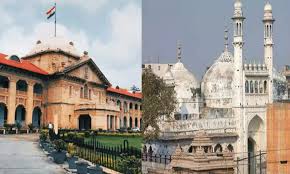Manas Dasgupta
NEW DELHI, May 31: Allowing the case to continue before a local Varanasi court, the Allahabad High Court on Wednesday dismissed a plea by the Anjuman Intezamia Masjid Committee, which manages the Gyanvapi mosque, against the civil suits that sought the right to worship Maa Shringar Gauri and other deities within the mosque premises.
In a setback for the mosque committee, the Allahabad High Court ruled that the lawsuit filed by a group of Hindu women worshippers seeking the right to pray in the Gyanvapi mosque complex in Varanasi was valid ad maintainable allowing the case to continue in the Varanasi District Court.
The litigants in the case – Lakshmi Devi, Rekha Pathak, Sita Sahu and Manju Vyas – had filed the case in August 2021 seeking the right to regularly worship goddess Shringar Gauri and other deities whose idols they claimed were located in the mosque’s complex.
The maintainability of this case was upheld by the Varanasi district judge in September 2022. The Anjuman Intezamia Masjid (AIM) Committee and the Uttar Pradesh Sunni Waqf Board had petitioned the high court to overturn the September 2022 ruling, arguing that it is not maintainable under the Places of Worship Act of 1991 and the Central Waqf Act of 1995.
The Allahabad High Court, after hearing the arguments, had reserved its decision on December 23, 2022. The case was one of the several spawned from a ruling in April 2021, when the Varanasi court directed the Archaeological Survey of India (ASI) to conduct a comprehensive survey of the mosque complex following a petition by Hindu groups. A pre-existing legal order has allowed hundreds of Hindu women to symbolically worship the goddess Shringar Gauri once a year in the complex.
The advocates representing five Hindu women called the Allahabad high court’s Wednesday’s ruling a “huge win” and asserted that soon a temple of Lord Shiva would be constructed at the site.
Justice JJ Munir passed this order after hearing the counsel for the rival sides at length. “We welcome the decision of the court to dismiss Order 7 Rule CPC plea filed by Anjuman Intazamia Mosque Committee which challenged the maintainability of the suit of five Hindu women worshippers seeking the right to worship inside Gyanvapi mosque,” Subhash Nandan Chaturvedi, a lawyer representing the Hindu side, said.
Hari Shankar Jain, another advocate representing the Hindu side, called the ruling “extremely important” claiming the “current religious war will prove a milestone.” “I hope that the day is not far when we will construct a grand Shiv temple there and the present structure will be removed,” Jain said.
In contrast, the lawyers representing the Muslim side, however, said the verdict was not a big win for the Hindu side as claimed and argued that the ruling can be challenged in the Supreme Court. Mohammad Tauheed Khan, the advocate representing the Muslim side in the Gyanvapi case, said the next course of action would be decided after reading the order.
The Muslim side on May 22 submitted its written objections before the Varanasi District Court in the matter of the Archaeological Survey of India (ASI) investigation of the entire Gyanvapi mosque premises. The court has fixed July 7 for the next hearing in the case.

